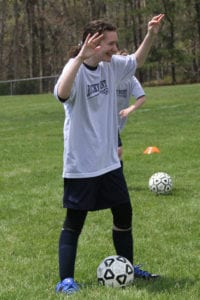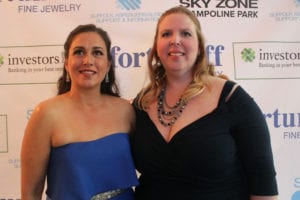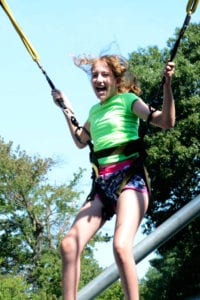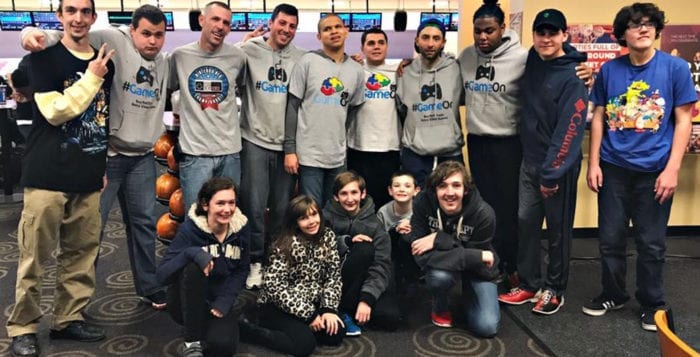By Jill Webb
Out of the 366,574 children residing in Suffolk Country, 2,445 of those children live with autism, according to a report in a three-point plan put out by U.S. Sen. Kirsten Gillibrand (D-New York) to address the disorder.
In an effort to give support to the intellectual and developmental disabilities community, several residents of Suffolk County have increased outreach in their areas.
Kids get their kicks
Rocky Point’s boys varsity soccer coach Joe Camarda, along with the girl’s coach, Pete Costa, created an opportunity for mentally and physically disabled kids to become athletes when they started Rocky Point’s TOPSoccer league in 2016.

Camarda and Costa, as teachers in district, understood the need for families to have special needs programs in their backyard, instead of having to search Long Island.
“We see it every day,” Costa said. “It’s extremely important for students with special needs to be socialized and it’s a good opportunity for them to interact with their peers.”
By working with the Long Island Junior Soccer League, the coaches host eight to 12 kids with varsity Rocky Point players volunteering to help out on the field.
“They can’t wait to come and help on Saturdays,” Camarda said of his varsity players.
As well as being a fun activity for the children, it is also a way for the varsity players to become educated on what it really means to have a disability.
“Truth is, that a lot of times they’re not in school with them, they’re not in class with them,” Costa said. “So, it’s an opportunity for them to learn what it’s all about.”
Putting the children in a field setting where there’s no pressure to perform, while also giving them the ability to develop their motor skills is a win-win for parents and their kids.
Camarda sees the dedication his athletes have to soccer, despite their disabilities. Rain or shine, they’ll be on the field with smiles on their faces, according to Camarda.
“The feedback we get from the parents is that they’re talking about it all week,” he said. “They can’t wait to get here.”
In the future, they hope to put on a Special Olympics-style tournament, potentially called the Special World Cup.
“The community should provide opportunities for everybody regardless of what your needs are,” Costa said. “That’s what we’re here for. We’re here to help each other out.”
New friendships from old games
Game On owner Tristan Whitworth has opened the doors of his business to local special needs children who have bonded over a love of retro games.
“I basically just noticed that a lot of parents would come in with a child, or sometimes two, on the autism spectrum,” Whitworth said. “The parents would come talk to me and they’d say something like, ‘I don’t get it they’re so into these retro games and none of their friends are.’”
“The parents would come talk to me and they’d say something like, ‘I don’t get it they’re so into these retro games and none of their friends are.’”
— Tristan Whitworth
Retro video games and toys is exactly what Game On, with locations in Miller Place and Stony Brook, supplies its customers with. Whitworth loved seeing kids enjoying his games, but wanted to do more for them by connecting them to each other.
“We just had a huge customer base of all these children that loved the retro games, but they never had asked to hang out or see each other,” he said. “They would only play alone at home.”
Whitworth decided to host a game night for his customers to provide them an opportunity to make new friends. After a trial run held at his store, he decided he needed to upgrade venues. After contacting a couple local churches, he found his fit with North Shore United Methodist Church in Wading River.
Whitworth’s events became The Autism Social Club & Game Night in October 2016, a free monthly event that brings together autistic children, and all others with disabilities.
While Whitworth and his staff volunteer at each game night, Whitworth credits the parents as a big help in running the event, which hosts about 20 kids. All ages under 18 are invited, but Whitworth says most of the attendees are 10 to 15 years old.
Super Smash Bros. and Mario Kart are two of the most popular games among the kids.
“They really love the four-player games for GameCube and Nintendo 64,” Whitworth said.
Some of the best moments, according to Whitworth, are when the kids give him a hug goodbye, and normally nonverbal children try to say “Thank you.”
The community’s need for programs like this is apparent, as Whitworth notices enrollment go up every month. .
Whitworth has even started organizing some outings for the group, like sponsoring 20 kids and their parents to go out for a night of bowling and pizza.
Bridging the information gap
In December 2015, Priscilla Arena and Stephanie Mendelson met up for a business meeting, but ended up discussing the lack of local resources for both of their young, autistic sons.
After confiding in each other, the two Mount Sinai mothers decided to take matters into their hands by starting Suffolk Aspergers/Autism Support & Information.

“We talked about how we felt fairly alone in that diagnosis and that there really weren’t a lot of local resources out here in Suffolk County for parents like ourselves,” Mendelson said.
Their first meeting was spurred by a Facebook post scouting out local parents who felt the same.
“Just like the child feels alienated, isolated, alone and misunderstood, so do the parents,” Arena said.
The group took form as 12 parents in a living room discussing issues, and since its first get-together, has grown into a free program of over 2,000 members.
Arena and Mendelson’s mission is based around providing education and knowledge — helping parents find out where their children can attend school, where they can live in their adult life and where they can find careers are just a small handful of questions SASI answers.
“We want to be a central resource for parents to go to no matter where they are in the diagnosis process, and even if the children are older,” Mendelson said. “A place to go to look for recommendations for doctors, services, advice, resources, and then of course emotional and financial support.”
Monthly support group meetings are held at John T. Mather Memorial Hospital in Port Jefferson, with relevant informational speakers providing similar information on getting access to services, finding psychologists and learning what support is available through the state.
“The best resource is actually the parents that come,” Mendelson said. “They share with each other things that have worked for them.”
SASI organizers pride themselves and the group in making members feel comfortable and catered to, because the directors were in the same boat.

“Our members refer to us as a family, and we’re slowly but surely changing the perception of the ASD population” Arena said. “That is something that no other autism organization has been able to accomplish, and that is because Stephanie and I are in the trenches face-to-face doing everything that they’re doing. There’s no detachment — we are walking, living, breathing the same thing.”
Mendelson and Arena recently launched SASI in Español because they noticed a stigma in the Latino community when it comes to discussing developmental disabilities and mental illnesses.
“The Spanish speaking community,
especially here on Long Island, has been so underserved and so ignored when it comes to resources,” Mendelson said.
One of the pair’s favorite programs SASI offers is a birthday club.
“Unfortunately a lot of these kids don’t get invited to regular birthday parties, so every month we throw a birthday party where they can all come and celebrate in a judgement-free atmosphere.”
At one birthday party, a child had a meltdown in the middle of the party, prompting the parent to get embarrassed and apologizing to everyone, but in response, was told by every other parent that she wasn’t alone.
“When I’m tired, or I feel like, ‘Wow, this is taking over my life,’ those are the moments that propel me forward,” Mendelson said. “They make me realize why this is so important and such a gift to do.”





